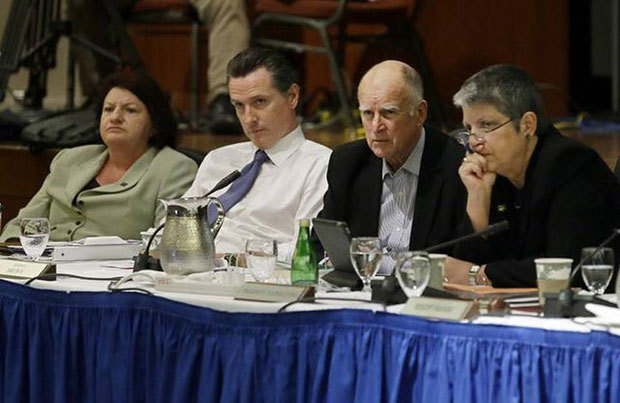California Assembly to apply zero-based budgeting to UC budget

State Assembly Speaker Toni Atkins, from left, Lt. Gov. Gavin Newsom, Gov. Jerry Brown and UC President Janet Napolitano listen to students speak during the public comments portion of the UC Regents meeting in San Francisco last year. The University of California has approved raising tuition by as much as 5 percent in each of the next five years unless the state devotes more money to the 10-campus system. Eric Risberg The Associated Press
By Toni Atkins and Kristin Olsen
Special to The Bee
When he was inaugurated for his fourth term last month, Gov. Jerry Brown pointedly noted that California students should not have to be “the default financiers of our colleges and universities.” He’s right – especially when you consider the financial burdens placed on students and their families in recent years.
Between 2008 and 2012, tuition and fees at the University of California and California State University almost doubled. UC tuition went from $6,636 to $12,192 per year. CSU tuition went from $2,772 to $5,472 per year. During the same years, the state cut funding for the universities in response to the recession and an overextended state budget.
Tuition increases are a burden for all students, even though higher-income families are more able to absorb them and lower-income families receive financial aid to offset them. While college should be more affordable for every California family, middle-income families have borne the brunt of tuition increases and are increasingly being priced out of higher education.
That’s why the Assembly led the effort to create the Middle Class Scholarship. Now in its first year and fully operational in 2017-18, the Middle Class Scholarship has already helped more than 77,000 California students at UC and CSU, with thousands more students eligible in the next application process.
Democrats and Republicans in the Assembly are working together to make program improvements and accelerate the full implementation of the Middle Class Scholarship to give more tuition relief beginning in 2015-16. Once fully implemented, the Middle Class Scholarship will reduce a recipient’s annual out-of-pocket tuition costs by as much as $4,900 at UC and $2,200 at CSU.
In light of UC’s proposed tuition increases that go in the opposite direction of our efforts to make higher education more affordable, the Assembly is also taking the lead on making sure UC is held accountable for how its leaders spend the money that students and taxpayers already provide to them.
In hearings beginning this week, the Assembly will apply the principle of zero-based budgeting to the UC budget. Through the zero-based budgeting approach, every line item of an organization’s budget must be approved, rather than only changes from the previous year. This allows for a thorough public discussion of the items contained in an organization’s budget, and it gives the agency the opportunity to show that each dollar is being spent for the intended purpose and in the right way.
Under the leadership of the Assembly Budget Committee, these hearings will give UC the opportunity to show efficiencies it has made – and to identify further efficiencies needed. The hearings will also give the Legislature an opportunity to scrutinize whether each dollar that could be spent holding tuition at its current level would be better spent on a different UC priority, as UC President Janet Napolitano suggests.
Brown and Napolitano have agreed to work as a “committee of two” to examine UC’s finances and funding. That will complement the Assembly’s zero-based budgeting process for UC, which will be conducted in open public hearings and be student-focused – how much does it really cost to educate students at UC and how do we maximize UC’s acceptance of California students.
Democrats and Republicans in the Assembly have our differences, but we definitely agree that no Californian should be priced out of a UC or CSU education. Given how much middle-income California families have already been impacted by tuition increases, the Legislature and the governor have to particularly consider how these students would be affected by any higher education proposal. The state must do its part and make higher education a top budget priority. And UC and CSU must do their part to become more efficient and not place cost increases on the backs of students.
Some of the Legislature’s biggest successes over the last year – the water bond, the rainy-day fund, tax credits that help California’s aerospace and entertainment industries compete – were all achieved on a bipartisan basis. California families who want to send their kids to college are counting on us to add affordable higher education to our list of bipartisan successes, and we intend to do it.
[Source]: Sacramento Bee


